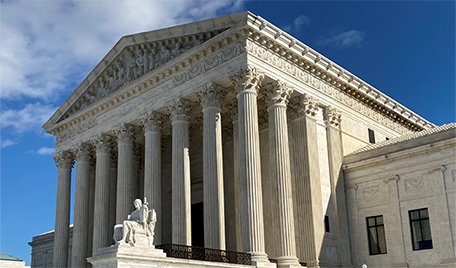The Supreme Court’s decision blocking states from removing former President Donald Trump from primary election ballots was unanimous on its biggest issue, but four justices raised questions about how a ban on insurrectionists could be handled in the future.
 On Monday morning, the Court released an unsigned, or per curiam, decision in Trump v. Anderson, a case appealing a Colorado Supreme Court ruling that permitted disqualifying Trump from that state’s primary ballot. All nine justices agreed in the judgment that such a disqualification power was not held by the states. Beyond that, they showed a difference of opinion over the need to define if only Congress can decide disqualification requirements.
On Monday morning, the Court released an unsigned, or per curiam, decision in Trump v. Anderson, a case appealing a Colorado Supreme Court ruling that permitted disqualifying Trump from that state’s primary ballot. All nine justices agreed in the judgment that such a disqualification power was not held by the states. Beyond that, they showed a difference of opinion over the need to define if only Congress can decide disqualification requirements.
Norma Anderson, a Colorado elector, and other state residents sued to have Trump removed from the Colorado primary under Section 3 of the 14th Amendment, claiming the amendment’s language barred service in federal office for someone who took part in an insurrection against the government and who had sworn an oath to protect the Constitution.
The Colorado Supreme Court overturned a state district court decision that found Trump had engaged in an insurrection, but that the Section 3 language raised doubts if it applied to Trump. In its 4-3 decision, the Colorado Supreme Court said the Section 3 language applied to Trump; that Congress did not need to pass a law to allow Section 3 to go into effect; and the state under Colorado’s election code could enforce Section 3 against Trump.
The Per Curiam Opinion
The Supreme Court’s opinion addressed several of these questions. There was a unanimous agreement that states did not have a role in disqualifying federal officeholders and candidates. “We conclude that States may disqualify persons holding or attempting to hold state office. But States have no power under the Constitution to enforce Section 3 with respect to federal offices, especially the Presidency,” the opinion stated.
Concurring only in the judgment, Justices Sonia Sotomayor, Elena Kagan, and Ketanji Brown Jackson believed Colorado on its own could not disqualify Trump. “Allowing Colorado to do so would, we agree, create a chaotic state-by-state patchwork, at odds with our Nation’s federalism principles.” Citing on several occasions an opinion in U.S. Term Limits v. Thornton (1975), the three justices thought “our Constitution leaves some questions to the States while committing others to the Federal Government. Federalism principles embedded in that constitutional structure decide this case. States cannot use their control over the ballot to ‘undermine the National Government.’”
The justices disagreed in how the federal government would determine the issue of Section 3 disqualification. Five majority justices in the unsigned opinion decided that Congress would need to pass legislation to enforce the 14th Amendment’s disqualification provisions. “Because the Constitution makes Congress, rather than the States, responsible for enforcing Section 3 against federal officeholders and candidates, we reverse,” the five justices wrote in the opinion’s second paragraph.
The five justices pointed to Chief Justice Samuel Chase’s 1869 circuit court decision in Griffin’s Case, and also the Colorado Supreme Court’s decision as requiring a “determination” that Section 3 applies to a particular person “before the disqualification holds meaning.”
“The Constitution empowers Congress to prescribe how those determinations should be made. The relevant provision is [the 14th Amendment’s] Section 5, which enables Congress, subject of course to judicial review, to pass ‘appropriate legislation’ to ‘enforce’ the Fourteenth Amendment,” the five majority justices concluded.
The Concurring Opinions
Justices Sotomayor, Kagan, and Jackson disagreed with the majority’s ruling that the Court needed to decide at this point if the Congress needed to pass legislation to put the disqualification clause into effect.
Citing two landmark Supreme Court decisions, Dobbs v. Jackson Women’s Health Organization and Marbury v. Madison, the three justices argued the “fundamental principle of judicial restraint is practically as old as our Republic.” They saw the majority’s finding that it was up to Congress to enact legislation pursuant to Section 5 of the 14th Amendment as problematic and closing “the door on other potential means of federal enforcement.”
The three justices argued among the other possible federal actions were “when a party is prosecuted by an insurrectionist and raises a defense on that score” and the elimination of “enforcement under general federal statutes requiring the government to comply with the law.” The results would “insulate all alleged insurrectionists from future challenges to their holding federal office,” they believed. “Although we agree that Colorado cannot enforce Section 3, we protest the majority’s effort to use this case to define the limits of federal enforcement of that provision. Because we would decide only the issue before us, we concur only in the judgment,” they concluded.
Justice Amy Coney Barrett also wrote a concurring opinion that the Court only needed to settle the issue of Colorado’s ability to enforce the insurrectionist ban. “This suit was brought by Colorado voters under state law in state court. It does not require us to address the complicated question whether federal legislation is the exclusive vehicle through which Section 3 can be enforced,” she wrote.
“The majority’s choice of a different path leaves the remaining Justices with a choice of how to respond. In my judgment, this is not the time to amplify disagreement with stridency,” Barrett wrote in her two-paragraph opinion.
The Court did not rule on several other arguments from the lower courts, including if Trump took part in an insurrection against the government.
Scott Bomboy is the editor in chief of the National Constitution Center.







